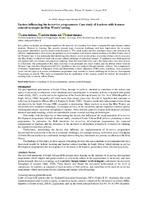Factors influencing the in-service programmes: Case study of teachers with learner-centred strategies in Blue Waters setting
Abstract
Key policies on teacher development emphasise the necessity of a teaching force that is competent to apply learner-centred practices. Barriers to learning, like poverty, present huge classroom challenges and have implications for in-service programmes intended to develop learner-centred practices. This study endeavoured to determine factors that influenced the effective implementation of in-service programmes to assist teachers with learner-centred teaching in the Blue Waters area of the Western Cape. It was anticipated that identifying these factors would assist teachers in poverty-stricken schools in an area like Blue Waters to effectively deal with poverty-related challenges of individual learners. A qualitative case study approach was applied with convenience and purposive sampling. Semi-structured interviews and a document study were used as tools to collect data. The participants of this study consisted of one principal, one social worker, and one district officer from the Western Cape Education Department (WCED). Qualitative data was analysed through thematic analysis. The competencies of teachers, Department of Education (DoE) and Department of Basic Education (DBE) policy intentions, socio-economic issues, and the types of in-service development programmes were revealed as factors inhibiting the In-Service Development Programmes at schools. This study recommended that the application of this strategy needed the holistic development of teaching skills at schools in Blue Waters.

